Business partnerships are a lot like personal partnerships in more ways than one. The people involved in these relationships need to establish clear communication and proper understanding to make…
continue reading
21+ Samples Artist Management Contracts
-
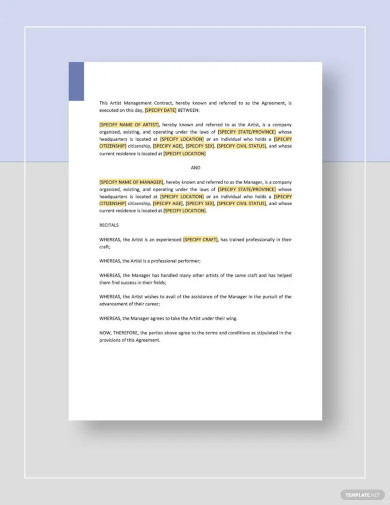
Artist Management Contract Template
download now -
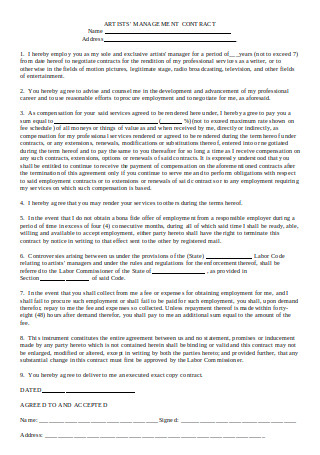
Artists’ Management Contract
download now -
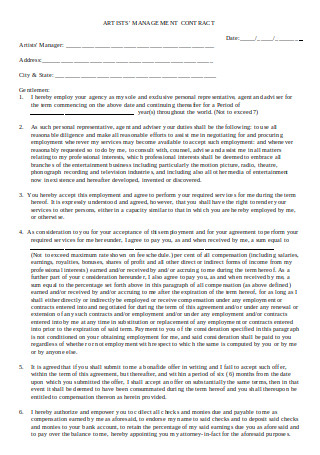
Artist’s Management Contract
download now -
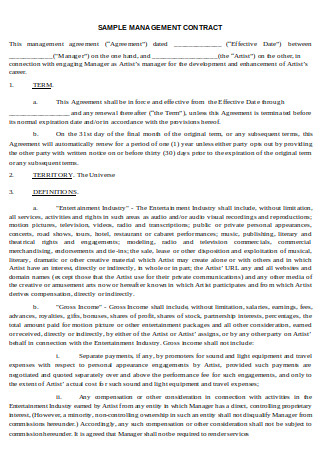
Sample Management Contract
download now -
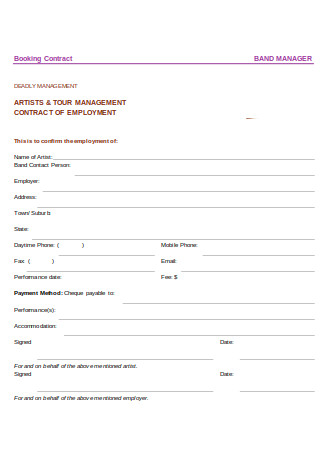
Artist and Tour Management Contract
download now -
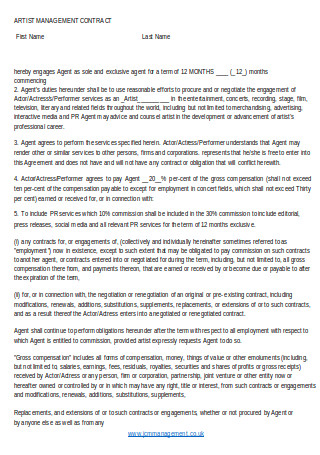
Artist Management Contract
download now -
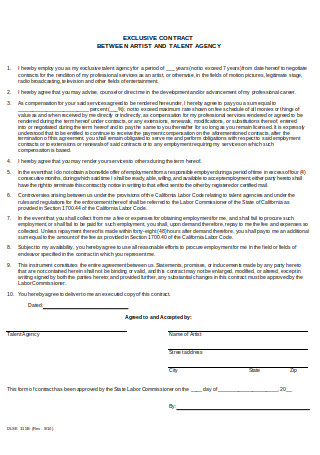
Artist Exclusive Contract
download now -
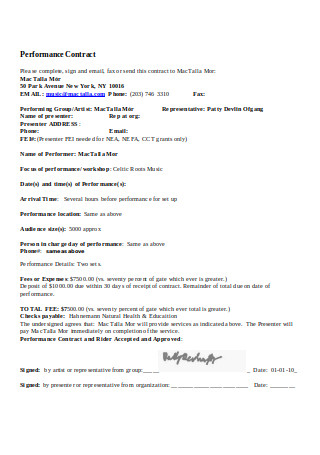
Performance Contract
download now -
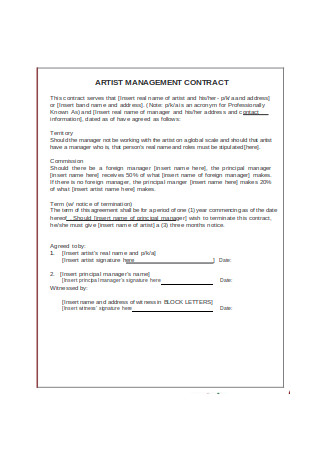
Artist Management Contract in Word
download now -
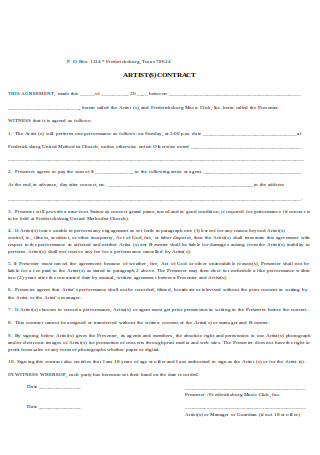
Artists’ Contract
download now -
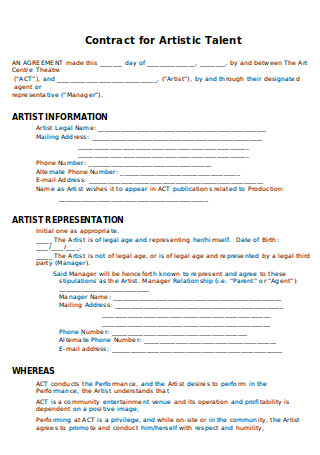
Contract for Artistic Talent
download now -
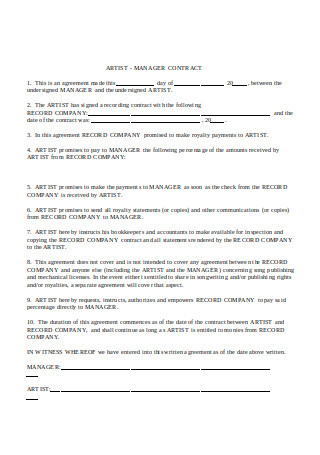
Artist Manager Contract
download now -
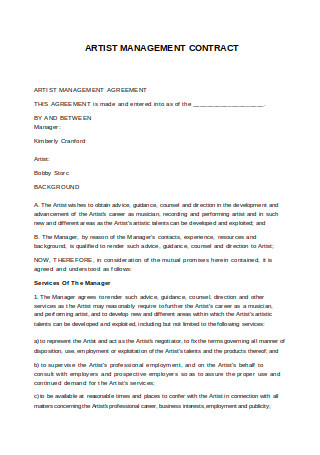
Simple Artist Management Contract
download now -
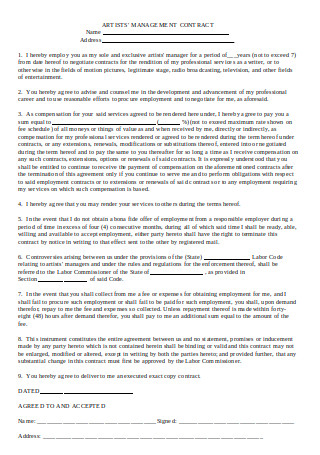
Artists’ Management Contract Sample
download now -
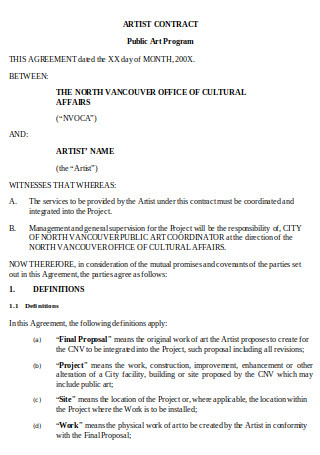
Sample Artists’ Contract
download now -
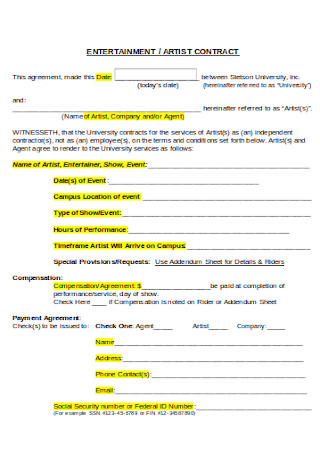
Entertainment/ Artist Contract
download now -
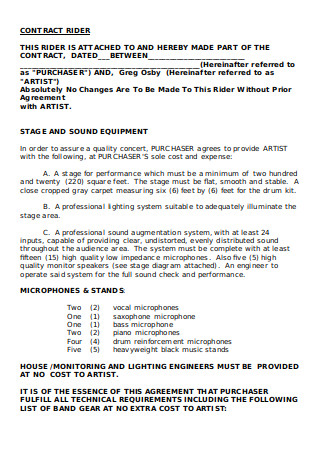
Sample Contract Rider
download now -
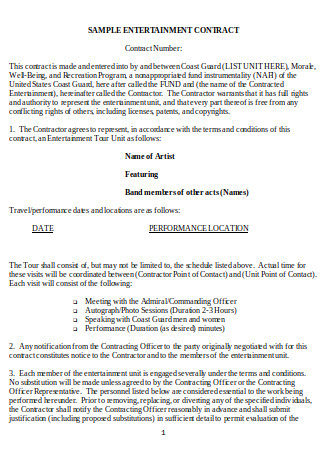
Sample Entertainment Contract
download now -
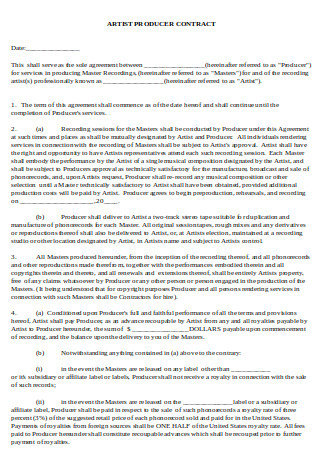
Artist Producer Contract
download now -
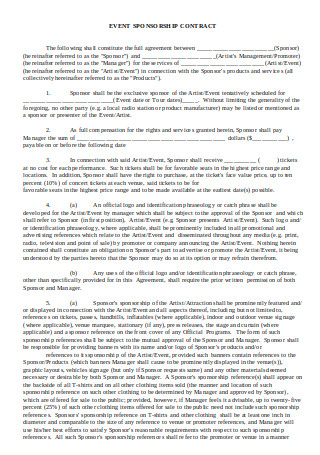
Event Sponsorship Contract
download now -
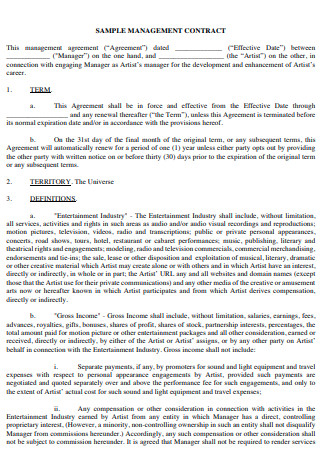
Sample Mgmt Contract
download now -
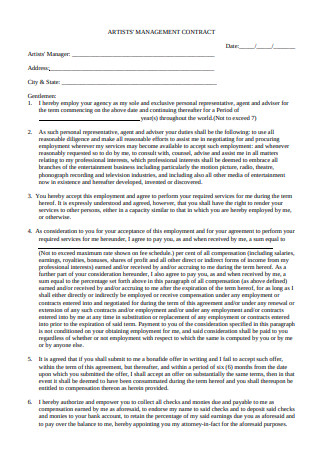
Artists’ Management Contract in PDF
download now
What is an Artist Management Contract?
Artist Management Contracts are agreements entered by artists—such as singers, composers, actors, and painters. It is commonly used in the entertainment industry. The agreement’s main purpose is to help artists handle their careers by engaging the service of a personal manager or a management company. Instead of focusing on getting signed in a record label, worrying about their schedules, advertising their artworks, and all other administrative problems, an artist can just solely focus on creating their art and leave the business management to the managers. The management contract outlines a manager’s specific obligations, the amount of his compensation, and the duration of his term as manager—which we will discuss later on.
Know Your Manager: Different Kinds of Managers
In order for us to deeply understand the work of an artist manager and his importance in an artist’s career, we should acquaint ourselves with the different kinds of managers that exist in the entertainment industry. According to Small Business Website (2013), there exist six (6) types of music managers. These are the:
What to Look for Before Signing an Artist Management Contract?
Now that you’re introduced to the different managers you’ll encounter in the entertainment industry, you can move on to knowing important clauses you can find in an Artist Management Contract and an artist and manager contract. Aspiring artists or artists, in general, should read before signing any contract to ensure that they are protected and that their best interest is considered. If you find yourself about to sign a management contract, try to find these important clauses. If you do find them, take the necessary measures to protect yourself.
Exclusivity Clause
“I alone”, a song many of us might not have heard of but has a title name that best describes an exclusivity clause. An exclusivity clause states that you are the only artist the manager is representing. This ensures that your music career has the undivided attention of your manager. He can focus all his efforts on trying to land you a record deal, sponsorships or brand deals, and other major contracts related to being an artist. Finding an exclusivity clause in your contract is usually a good thing.
Duration: Short Term vs Long Term Management Contracts.
“Will we be together forever?” Most likely not. Short-term contracts are highly suggested; think of it as a probationary period—if you like how he manages you, you can extend the contract for another term until you stop liking him. Souring artist-manager relationships is not uncommon in the music industry. Hence, short-term contracts are the way to go.
Control: Contracts and Financial Affairs
“I own you.” Can the manager enter into contracts on behalf of the artist without his prior consent? An artist is typically made to sign a power of attorney to enable the manager to take care of his career administration—entering into sponsorship agreements, record deals, brand deals, and the like. Control can also be over the artist’s financial affairs. Who holds the bank account? An artist should reserve at least an ounce of control over his person. Don’t leave every aspect of management to your manager!
Copyright Agreement
David Bowie, one of the greatest icons in music history, was formerly managed by Tony Defries. When the two had a major fallout, Bowie had to sack Defries. Little did Bowie know that Defries actually owned the copyrights of most, if not all, of the music made during the duration of the management service agreement. This paved the way for a really long and costly legal battle between them. This is an example of why we should always read a contract in its entirety.
Sunset Clause
“Our relationship continues to exist despite death.” This is a clause you should watch out for when signing an artist management agreement. A sunset clause states that the manager shall continue to receive commission despite the expiration of the contract and his term as manager. Managers are under the impression that without them, the artist would not have reached stardom. Even if the management contract has expired or terminated, the manager still receives a percentage of the royalties for all the deals signed and songs produced during his term as manager.
How to Write an Artist Management Contract
Finally, the moment you’ve been waiting for. You’re sitting on a black leather chair in the conference room of your soon-to-be manager. You’ve educated yourself with Artist Management Contracts and you’re ready to enter into one. However, there are certain steps that need to be done and discussed before actually signing one, as provided below.
Step 1: Define the Relationship and Expectations of the Parties
“Are we on the same page?” The written document containing the artist management agreement should clearly state the roles each party plays in the artist-manager relationship. This includes the specific obligations of the manager and the contributions to be made by the parties. Future conflicts are avoided in the future by outlining the artist-manager relationship in the contract and by stating expectations beforehand.
Step 2: Provide the Duration of the Contract
An artist management contract can either be short term or long term. Long term contracts should only be entered when both parties have established a strong relationship. Management contracts are based on trust. The duration of the management contract should be proportionate to the trust level you have over your soon-to-be manager. But to be sure, it’s best to choose a shorter term. If you like how you’re being managed, you can always choose to extend the contract.
Step 3: Executing a Power of Attorney
A power of attorney needs to be executed in order for the manager to manage the artist effectively. A Power of Attorney is an authorization given to the manager to enable him to sign contracts, accept and endorse banknotes, demand and/or sue, and etc. on behalf of the artist. It is worth noting that there are two kinds of Power of Attorney; general and limited. The inclusion of a general power of attorney in a management contract is considered a red flag. A manager’s powers to sign documents for the artist should be limited.
Step 4: Commission Rates
A manager does not get paid if the artist is not paid. Talent managers work on commission. That’s why they have to make sure that they negotiate the best talent fee possible for their artist. Customarily, most managers receive a commission of 10-25% of the artist’s gross or net income. The percentage of commission is negotiated before the signing of the management contract. Usually seasoned and well-experienced talent managers have a higher commission rate compared to talent managers created overnight.
Step 5: Breaking-Up: Ending the Management Contract
What happens when the artist wants to terminate the management contract before its expiration? The option to terminate the contract based on valid grounds should be made available. An artist should be able to terminate the management contract when his manager neglects his duties and obligations. It is best to discuss the possibility of this scenario with your soon-to-be manager before writing the management contract.
Behind every artist’s success story is a hard-working manager who helped shaped music careers. We wouldn’t be listening to the music we love if not for the tandem of artists and managers. Music artists create the songs and the managers help spread it to the public—phone call after phone call, just to reach radio stations asking to have their artist’s songs played on a loop. To conclude, artist managers have a very important job in advancing the music careers of our favorite artists. Someday we’ll achieve our own stardom and might find ourselves being presented with an Artist Management Contract. When that day comes, we’ll be prepared with a basic understanding of it.

